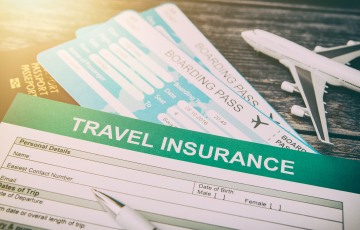Receive Compensation for Lost Baggage at Airport from Travel Insurance
Imagine that you are landing at your dream destination and ready to explore new things, but you discover that your baggage is nowhere in sight. It's a traveler's worst nightmare and one that can quickly turn a much-anticipated trip into a stressful experience. However, you can minimize the impact of lost baggage at airport with travel insurance and get back to enjoying your journey.

Travel insurance can help minimize the stress of lost baggage at the airport, allowing travelers to enjoy their journey.
1. What is lost baggage insurance and how to get it?
Lost baggage insurance is referred to as baggage delay or baggage loss coverage. It is a type of insurance that provides compensation for travelers when their checked luggage is lost, delayed, or damaged during a trip.
This coverage is typically offered as part of travel insurance policies, and it can help travelers recover the value of their belongings in case of luggage-related issues.
Moreover, the most common way to get lost baggage insurance is by purchasing comprehensive travel insurance on Travelner Insurance. We offer a diverse array of coverage options, ensuring that you have the peace of mind when embarking on your journeys.
>>> Read more: How Travel Insurance Works For Baggage?
2. What to do if you have luggage left at airport?
One of the most inconvenient scenarios that you can encounter is the prospect of leaving you luggage behind at the airport. Let’s demonstrate what should you do if you lost baggage at airport with Travelner Insurance:
2.1. Stay calm:
First and foremost, you need to stay calm and don't panic when you have lost baggage at airport. Because there are many established procedures that you need to face for dealing with lost luggage or missing luggage at airport.
2.2. Contact the airport lost and found department:
You head to the airport's lost and found department or information desk at the airport to connect with staff. These areas are usually located near the baggage claim or check-in areas. Then, the airport personnel can provide guidance and check if your luggage has been turned in.

Visit the airport's lost and found department or check-in areas for assistance and check-in luggage.
So you approach airport personnel and give them as many details as possible about your luggage. Describe the features of your bag and if you have your baggage claim ticket or boarding pass, this will be helpful for identification.
2.3. Fill out a lost baggage report:
If your luggage is not immediately found, you may be required to fill out a lost baggage report. This report documents the details of your lost luggage, and it is a critical step because you will need these documents when filing a claim with your travel insurance provider.
If you're worried about your bags getting left at the airport it's crucial to get the right travel insurance that covers all aspects of lost luggage before you start the trip for the comprehensive protection from insurance policy. Additionally, you should hold onto all receipts, for any purchases you make while waiting for your bags to be delivered in order to file a travel insurance claim for lost baggage at airport.

A lost baggage report is crucial for filing a claim with your travel insurance provider if your luggage is not found immediately.
3. How to get compensated if you lost baggage at airport?
Travelner Insurance know that losing luggage at the airport can be a frustrating experience, but you can follow these steps from us that guide you through the process of ensuring that you are duly compensated for your loss.
3.1. Reporting the loss immediately:
The first and most crucial step in the event of lost luggage is to report it immediately. Once you've realized your luggage is missing, head to the airline's customer service desk. They will provide you with a Property Irregularity Report (PIR), so this document is essential for your insurance claim, so make sure to keep a copy.
3.2. Contact your travel insurance provider:
Notify your travel insurance provider about the lost luggage situation. Most insurance companies have a 24-hour hotline for assistance, so contact them as soon as possible. They will guide you through the claims process.
3.3. Document your loss:
Keep all documentation related to your luggage and its contents. This may include receipts, boarding passes, and the PIR from the airline. If possible, you should take photos of your luggage before departure to document its condition and contents.
3.4. Keep all documentation:
It's important to keep copies of all documentation related to your travel, including your boarding pass, baggage claim ticket, and any communication with airline staff. Because this paperwork will be crucial when filing a claim for compensation.
3.5. File a claim:
Follow your insurance provider's instructions for filing a claim. They may ask for specific forms to be completed and supporting documents to be submitted, such as your receipts for the lost items.

To file a claim, follow the instructions, which may require specific forms and supporting documents.
3.6. Itemize the lost items:
Create a detailed list of the items inside your lost luggage. Include their approximate value and any applicable receipts. This will help the insurance company assess your claim.
These steps are essential, as the sooner you report the loss, the higher the chances of a successful recovery or compensation. Then, the travel insurance company will evaluate your claim and inform you of their decision. If your claim is approved, they will typically reimburse you for the lost items, up to the policy's coverage limits.
4. How much money for the lost baggage claim amount?
With the Patriot Platinum policy from Travelner Insurance, the lost baggage claim may amount to this particular insurance policy is subject to a maximum limit of $500. In the unfortunate event of lost luggage, the reimbursement is set at $50 per item.
However, it's important to note that this coverage is not subject to a deductible. This means that the policyholder is eligible to receive compensation for the lost items up to the specified limit of $500 without having to cover any out-of-pocket deductible expenses.
It's advisable for individuals with this insurance coverage to keep track of their belongings and report any lost items promptly to initiate the claims process and receive the appropriate reimbursement for the covered losses.

Travel insurance will ensure you safeguard your belongings and mitigate potential airport baggage loss impacts.
5. How to find the best travel insurance for lost luggage international flight?
Finding the perfect travel insurance coverage to protect against the unfortunate occurrence of lost baggage at airport can be quite a challenging task for you before you start your trip.
Therefore, Travelner Insurance understand the importance of safeguarding your cherished belongings as you enjoy your global adventures. Our specialized travel insurance coverage for lost baggage at airport is designed to provide you with an essential safety net, offering protection and peace of mind for your trip.>
In order to make an informed decision about the travel insurance plan that best suits your needs after comparing policies on the Travelner Insurance website, you can consider consulting with our advisors for more detailed information about the plans.
In this way, you can embark on your journeys with the assurance that you have taken the necessary steps to safeguard your belongings and mitigate the potential impacts of lost baggage at airport.

To make an informed travel insurance plan selection, consult with Travelner advisors for detailed information on policies.
Conclusion
Losing track of your luggage can quickly turn a promising journey into a stressful ordeal. Therefore, with the right travel insurance policy for lost baggage at airport from Travelner Insurance, you will gain the peace of mind that comes from knowing your belongings are covered.
In case of loss to your baggage, the compensation you receive can help you replace essential items, ensuring your trip remains as enjoyable as you had envisioned. It's a proactive step toward mitigating the potential disruptions and inconveniences that can arise while traveling.
Explore tailored travel insurance and protect your trip now!
Related articles

Jun 25, 2024
Compare Annual Travel Insurance Plans: Find the Perfect Protection for Your Frequent Travels

Jun 19, 2024
Unpacking IMG Travel Insurance Reviews: Is It the Right Choice for Your Travel Needs?

Jun 18, 2024
Compare Travel Insurance Packages: A Comprehensive Guide

Jun 18, 2024







